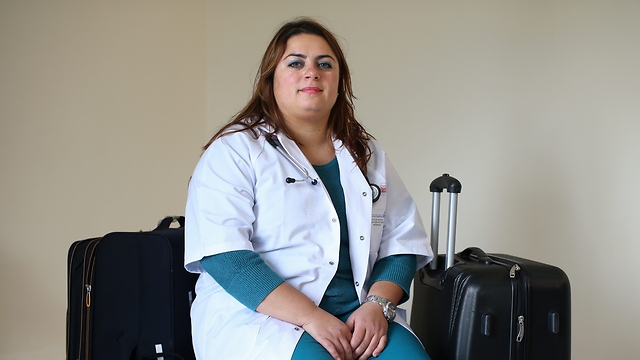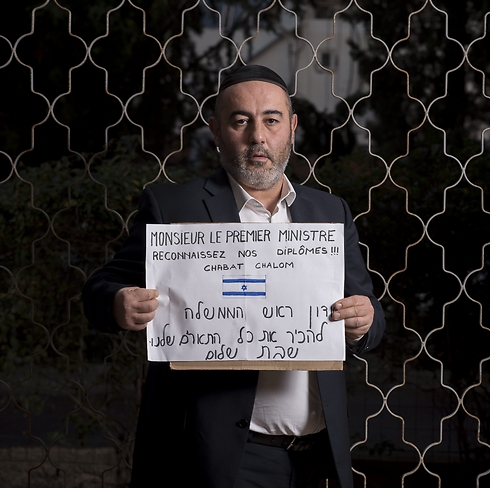Prime Minister Netanyahu promised to welcome them with open arms, but French doctors and dentists are hardpressed to have their diplomas recognized and so have soured on making aliyah.
Until two years ago, David Tibi, 46, was a very in-demand dentist in Paris. So much so that even former Absorption Minister Ze’ev Boim flew to France to entrust his teeth in Tibi’s capable hands. But the wheel of fortune has turned and now Tibi is sitting at home. Not because he made a professional mistake, but because he made a different mistake: making aliyah.
Saturday marked exactly a year since the attack on the Hypercacherafter which Prime Minister Benjamin Netanyahu called on French Jews to immigrate to Israel, promising to receive them with open arms. Miraculously, the Health Ministry has still not heard of Netanyahu’s promise. The ministry responsible for licensing health care professionals and paramedical has become a barrier to making aliyah. Thousands of French Jews – doctors, dentists, nurses, pharmacists, psychologists, physiotherapists, speech therapists and dieticians – do not come to Israel due to the difficulties their profession’s registration office give them.
Canada awaits you
David and Marcel Attia, in their 40s, are both veteran dentists. They have been living out of their suitcases in rented apartments for years in Marseille because they plan on making aliyah. “We want to go, but cannot. I came to Israel in October to pass the licensing test,” recounted David. “I passed the theoretical test, but failed the practical test. In France I do a lot of complex things like transplants and surgeries, and here I was disqualified on first-year student material. It seems that in Israel there are either other methods or they are purposely failing people.”

About 70 percent of olim fail the theoretical dentistry test. About 90 percent fail the practical exam. Despite the slim chances of passing, Marcel will take the theoretical exam this March. “It took us more than a year just to get permission to take the exam,” says Marcel. “I thought the most difficult part of our aliyah would be sending our three sons to the army, I now realize that our main problem will be providing for our children in Israel until they reach the army.”
Jacques Atlan’s future is probably in Canada. He is 52 and has been a dentist for 25 years in Nice, in the south of France. “Meanwhile I’m staying in France, but am preparing a getaway to Canada for myself,” he explains. “There the process is much simpler and they also speak French. I love Israel dearly but at the age of 52 I’m not going to study for a licensing exam. If today my diploma was automatically recognized we would make aliyah right away.”
Yaacov Hagoel, deputy chairman of the World Zionist Organization, is fully aware of the situation and confirms that what is at stake is the unrealized potential of thousands of immigrants. “From studies we have done we can painfully state that Israel is no longer the default choice for French Jews, especially regarding university graduates,” he said. “Professional barriers in Israel are causing French Jews to choose emigration to other countries. I believe this is a real emergency situation.”
Unlike dentists, doctors do not always have to pass the basic medical license examination. But even their lives are not that simple when it comes to the recognition of their specialization.
Dr. Caroline Ohayon, 31, made aliyah five months ago. In France she worked as a senior physician in the emergency room and taught students. “Israel is lacking emergency physicians,” she said. “Before I came to Israel, the department heads of both Soroka Medical Center and the Sheba Medical Center at Tel HaShomer said they would be glad to have me. While still in France, I tried sending all the necessary documents to have my diploma recognized before coming here, but it didn’t work, so I decided to first make aliyah. Four months passed from the time I submitted all my documents until they recognized my diploma. Then problems arose regarding my specialty. I was asked to do residency again and take the test. I do not understand it.”
The body which advises the Health Ministry on what additional training each doctor needs to take to receive a specialist’s degree is the scientific council of the Israel Medical Association.
“Unfortunately there is an inherent conflict of interest in the body responsible for the approval of doctors and medical professionals in general,” explained Dr. Michael Ben Saadoun, head of Qualita, an association committed to helping French olim.
“The decisions of the committees are not transparent and not consistent. But the main problem is the conduct of Health Ministry officials. This is the opportunity to call the directors of the licensing board to look upon new professional olim as equals, to respect them and not to work against them. There can be only one conclusion: someone prefers foreign interests of closed guilds. The olim gained work experience in France, which has one of the world’s highest level of medical care. Today, they are putting their precious experience at our disposal, especially given the severe shortage of such professionals in Israel.”
The Israeli government also understands that reform is needed. In November 2015, the government decided to “remove barriers regarding the employment of olim in Israel.” Among other things, it was decided that the Health Ministry would work to facilitate, for example, a dentist with 14 years of experience to get a license. It was also decided that olim can access various licensing examinations in their mother tongue.
All these were supposed to be carried out, according to government order, by January 2015. But in the “Land of Bureaucracy,” things work at a different pace.
“On the Health Ministry’s website it says that one can be tested in French,” said Carol, 35, a nurse with 12 years experience who made aliyah a few months ago. “But then I found out that it was impossible to take the upcoming nursing test in French, and that I would have to wait until September. I cannot stay in the country until September without work and without money. If I have no choice I will return to France, and will return in nine months to take the exam.”
Advantages only for migrant workers
David Tibi already knows how difficult it is to live in Israel and work in France. For one year he tried to do it. “It was very difficult to fly and come back every time,” he says. “I have 25 years of experience, I am an expert at transplants, but I failed the practical test twice. The main goal of the test is to fail people. The World Health Association determined that France is number one in dentistry. Israel is only at 29. It is impossible to say we are not professional. I decided to fight. We’re talking about injustice.”

Tibi decided not to take the next practical exam as a sign of protest. A sign he made in broken Hebrew which asks the prime minister to recognize olim’s diplomas received massive support on the internet and since then he has been running from Knesset members to ministers in order to promote change.
“We will not acquiesce to this situation any longer,” he said. “This exam for dentists and all the other tortures of the Health Ministry in other health professions must be canceled. I came as a volunteer dentist in the IDF, and if I’m good enough to volunteer and treat IDF soldiers, I am good enough to work in Israel.”
Due to the severe shortage of doctors, Israel currently has 500 physicians, foreign workers, who are allowed to work in the country for up to five years without taking any examinations.
And here is the absurdity incarnate. Dr. Yeshayahu Homberger, a Christian from El Salvador, arrived in Israel as a foreign worker. For four years he worked at Shaare Zedek Medical Center and Hadassah Ein Karem Medical Center in Jerusalem. Homberger fell in love with Israel and Judaism and decided to convert. The moment he became a Jew and received an oleh certificate, the Health Ministry ordered him to take a licensing exam and even refused to continue giving him temporary work so that he could in the meantime support his children. For eight months he was forced to sit at home until he passed the exam and only then could he return to work.
Here then is a possible solution – to give doctors who make aliyah the same permission – but the Health Ministry is also opposed to this.
Various proposals to remedy the situation are being examined. A bill which will authorize the Health Ministry to exempt some veteran dentists from licensing exams passed in its first reading. A bill recognizing paramedical diplomas of French olim has been floating about for two years. Another bill raised by MK Oded Forer (Yisrael Beytenu) proposed to adopt the standards of the European Union regarding all medical and paramedical professionals.
Some olim have had enough. “If there is no tangible progress in the matter within three months, I will recommend French Jews to postpone or cancel their aliyah,” says French MP Meir Habib.
Two weeks ago, Habib discussed the issue with Prime Minister Netanyahu, who is a personal friend of his. Last week he met with Health Minister Yaakov Litzman. The politicians promised him that the professional barriers to making aliyah would be removed.
The Israel Medical Association (ISA) said in response: “We promoted awareness about the shortage of doctors among the public and decision-makers, in contrast to the position of the Health Ministry, which until recently claimed that there was no such shortage. We worked with the Immigrant Absorption Ministry and the Jewish Agency to facilitate the integration of physician olim. We set up a committee to assist in absorbing physician olim. The scientific council of the IMA operates according to clear and transparent criteria, published online and appearing in booklets given to olim. We encourage physician olim to contact us before immigration to coordinate expectations in advance.”
The Health Ministry said in response: “The Health Ministry attaches great importance to immigrant absorption and the integration of immigrants into Israel’s health system. At the same time, the ministry wants to ensure a proper professional level in order to protect public health. Anyone who wants a license to work in dentistry has to pass a licensing exam. The same goes for graduates from Israeli universities.”
As reported by Ynetnews
